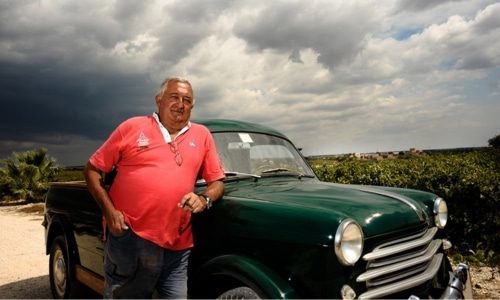
Marco de Bartoli
Marsala production dates back to the 1770’s, when the Englishman John Woodhouse accidentally stumbled across the local wine made in a method called il perpetuum, basically a fortified wine. He immediately shipped it back to England, where it was successfully received. This prosperity continued through the next century and beyond 1860, when the Italian states unified.
By the 1960’s, local wine cooperatives had grown considerably and production started focusing on quantity instead of quality. Instead of using the indigenous and traditional Grillo co-ops, they started blending all types of white grapes indiscriminately. Predictably, the increasingly poor quality of Marsala slowly killed off the reputation of what was once highly distinguished wine. Even today, many still consider Marsala little more than cheap cooking wine for the staple recipes of Italian-American restaurants.
Enter Marco De Bartoli. In his youth, Marco had worked with his father on his family farm near the town of
Marsala. But his obsession with cars and a need for speed proved too strong, leading to a first career as a professional race car driver. Towards the end of this career, however, Marco was ready to turn a new leaf. Thinking back on his youth, he felt a deep sadness that the once proud tradition of Marsala had sunken so low. He decided he wanted to change this.
First, Marco reconstructed his family’s old cellar on his mother’s farm in the contras of Samperi. Then he searched high and wide for old solera barrels of Grillo from local contadini. Much to his surprise, many were eager to part with these ancient relics, some even happy to give them to him for free. Next came the vines, planted progressively and exclusively in Grillo, which in Marco’s eyes was and is the only grape to make Marsala due to its high acidity ability to reach high degrees of alcohol and aging potential.
In 1984, Marco started a new project on the island of Pantelleria originally producing only a Passito. By the early 1990’s, his had garnered a stellar reputation for being alone in making truly stunning expressions of Marsala terroir.
But the story doesn’t end there. By the mid 1990’s, Marco’s children Renato, Sebastiano and Giusippina had all joined him in this work. Youthful energy led to new experiments, most notably dry white wines from Grillo and later Zibibbo from Pantelleria. While chemicals had never been used in the vineyards and the Grillo for the Marsala was never yeasted conventional yeasts were used on the dry whites until 2006.

est 2005
© 2025 Vino Veritas, All Rights Reserved





